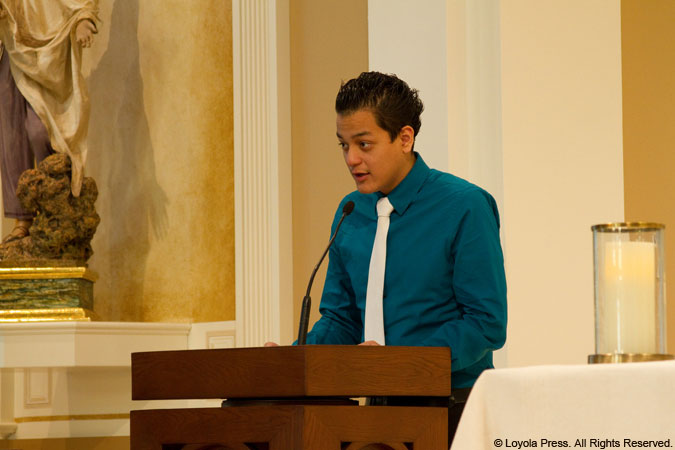
The General Directory for Catechesis states clearly that faith formation is to be an “apprenticeship” in the Catholic way of life (#67). This means, of course, that faith formation cannot be limited to the transmission of information but must invite one into a way of living that is transformational—one that changes our minds and hearts. For Catholics, part of our way of living involves practicing Corporal and Spiritual Works of Mercy, since we believe that love of God and love of neighbor are inseparable.
In an attempt to integrate this approach into catechetical programs in recent decades, it has become commonplace for Confirmation programs to include a service component. Unfortunately, such requirements are too often designed, implemented, and perceived as “hours to complete” and “hoops to jump through.” A better approach is to actually create apprenticeships for young people to participate in so that they not only receive an introduction to the Catholic “way of proceeding” but also connect with mentors. I recently came across an excellent example of an apprenticeship program for Confirmation at St. Sylvester Parish here in Chicago, under the direction of my friend Darius Villalobos, who doubles as the parish catechetical leader and as the Director of Multicultural Ministry at the National Federation for Catholic Youth Ministry.
Darius and his wife Lissette have implemented an apprenticeship program that invites Confirmation candidates to build a relationship with the parish community that seeks to accomplish the following three things:
- The youth do service that directly impacts the parish community, its mission, and ministry.
- The youth get mentored by people who can not only show them how to do their ministry, but can also share their own faith with the youth and model authentic witness.
- The youth engage in a ministry that they can continue after they have received the Sacrament of Confirmation and are encouraged to stay connected to the parish beyond initiation.
According to Darius, young people select or are assigned to a ministry and a mentor for an apprenticeship in the parish. At the end of the apprenticeship, young people engage in discernment and evaluation to determine if they will continue in their selected ministry beyond the religious education program. For starters, Darius and Lissette have chosen liturgical ministries for apprenticeships but plan on expanding into other ministries. The mentors have the following responsibilities:
- Meet with the apprentice an average of two times a month, from November to March, to help instruct the young person in the ministry in which he or she is being apprenticed.
- Teach and help the young person execute the ministry in which she or he is being apprenticed.
- Share with the young person their own call to ministry and why they find it important to serve the Church in the ministry they are doing.
- Do three updates (reports on the apprentice) for the program coordinators: one at the beginning, one in the middle, and one at the end of the year.
- Participate in an end-of-the year discernment and evaluation day to help the young person decide if he or she will continue in the ministry.
Here are Darius’s reflections after piloting this apprenticeship program last year for the first time.
We did not know how the apprenticeship would work in the parish. We often bristle at change, and this was a big one for the parents and the adults being asked to mentor. However, the pastor was very supportive and insistent that we give this a try, especially in light of all the young people that we have seen disappear from the parish after Confirmation. We started with just liturgical ministries as the apprenticeship opportunities, knowing that they were already being asked to participate in Mass as part of their Confirmation prep, so this would make the program feel like less of a burden and help these young people be more engaged in the Mass.
The results were very positive. For the youth, they were able to meet and interact with other adults in the parish, learned about a ministry in the Church and how to do it, and their reflections showed they were engaging and thinking about the Mass in new ways. For the adults, it helped them understand how important it was to share their stories of their call to ministry. They also appreciated needing to teach others about their ministry, as teaching is a great way to learn something more deeply and intimately. Finally, we did have a handful of youth from our class return this year to continue to help in the ministries they were apprenticed in, and a couple who went on to try new ministries. For the parish, it was a great success, and we will be implementing the apprenticeship model with all of our Confirmation classes in the religious education program this year.
Thanks, Darius!
Confirmed in the Spirit is a comprehensive, flexible, fully bilingual Confirmation preparation program that speaks with relevance to the hearts and lives of young people.





We do the same at our parish. The candidates work with the R.E. catechist team of their choice (Prek 4 up to 6th grade) We have found this mentoring model as a vital opportunity in assisting the candidate to live their faith. This experience has led some candidates to become catechist assistants or become a catechist when they reach adulthood. Some have gotten involved in other ministries too. It definitely “takes a Village” as they say to form our children in the Catholic faith. They are the future of our Church.
Thanks for sharing your experience Maureen! Sounds very effective!